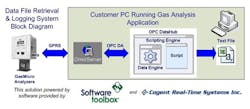Off-the-Shelf OPC Tools Create Custom Solution
A large natural gas supplier serving more than 1.5 million clients in several states has a wireless network of approximately 225 GasMicro analyzers that were being accessed via GPRS Modem. These analyzers are able to store pressure and temperature data in extended log files over the course of approximately 30 days.The ChallengeThe gas supplier has a gas analysis program that can read data from text files in a specific format.They wished to feed the data from the extended log files in the GasMicro analyzers into the analysis program in the very specific format required by the analysis program. The extended logs need to be extracted from all of the GasMicro analyzers regularly every 30 days. Regular retrieval is essential to prevent data loss due to overwritten data once the maximum log file size is reached. Robust error handling was a must to minimize risk of lost data.The GasMicro analyzers are able to communicate with a host PC via RS-232 serial port or via GPRS modem that exposes an Ethernet IP address. The protocol used by the GasMicro analyzers to get the log files from the device was a proprietary protocol for which an out-of-the-box OPC Server did not exist in the market.The SolutionTo meet all of the requirements of this implementation, Software Toolbox, located in Matthews, N.C., delivered a solution using two of its off-the-shelf OPC products: the OmniServer Universal I/O Server and the OPC Data Hub.The OmniServer was used to build a protocol configuration to speak the GasMicro proprietary protocol and request the extended log file data. To speed implementation, Software Toolbox’s professional services team helped the client to implement the protocol in OmniServer and the client is able to maintain and support the implementation going forward on their own. The OPC Data Hub was then connected to OmniServer via OPC, giving it access to the extended log file data for logging in the very specific format required by the customer’s gas analysis program. There are several details in the data logging requirements that required special attention:
- First, the format of the data being logged to the text file was not a format supported by other off-the-shelf data logging applications.
- Second, the GPRS network being used for communication had known reliability issues. This required robust error handling by the data logging application in order to ensure that all data was collected successfully.
- No restrictions on the format of the data being logged to the text file.
- Conditions are configured into the logging cycles to monitor for success or failure of logging from any device, allowing for retries as needed.
- The logging cycle can begin precisely every 30 days or any other increment of time specified by the client. On-demand logging of single devices was also provided for.
- The configuration for persistence data logging progress, so a power failure or any other interruption in logging would not result in a loss of data. Logging would resume automatically on restart.

